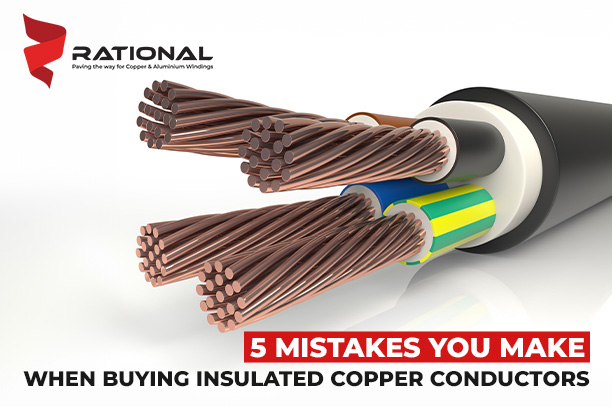Insulated copper conductors, those workhorse wires you use in almost every electrical project, might seem simple. But there’s more to buying them than just grabbing a roll at the hardware store. Make a mistake, and you could end up with wires that overheat, malfunction, or even cause a fire.
Keeping proper precautions and considering all possibilities is the way to lessen hazards. Mistakes can happen, but an error like this can damage a whole lot of things including life. Hence, today we’re going to break down 5 common mistakes people make when buying insulated copper conductors, so you can avoid them and get the perfect wires for the job.
Mistake 1: Ignoring Wire Flexibility
Imagine trying to bend a stiff pipe around a corner. Not going to happen, right? The same goes for insulated copper conductors. Consider how you’ll be using the wire. Tight spaces? Lots of bends and turns? You’ll need a flexible conductor. Look for stranded copper wires, where many thin copper strands are twisted together. They’re much easier to work with than solid copper wires.
Mistake 2: Not Checking Resistance
Think of resistance as the wire’s personality. A low-resistance wire in insulated copper conductors lets electricity flow easily, while a high-resistance wire puts up a fight. Here’s the key: a wire’s size and length affect resistance. If you use a wire too thin or too long for the current it needs to carry, it will heat up. Hot wires are unhappy wires, and unhappy wires can lead to trouble.
Mistake 3: Size Does Matter (Especially Wire Size)
We’ve all heard “size matters,” and it definitely applies to insulated copper conductors. Each wire size (given by a number like 12 AWG or 14 AWG) is rated for a specific amperage (current) it can handle safely. Using a wire too small for the current is a big no-no. It can overheat and melt the insulation, causing a fire. Always check the recommended wire size for your project. Look for it in the appliance manual or consult a qualified electrician if you’re unsure.
Mistake 4: Skipping the Pinhole Test
Tiny holes in the insulation of insulated copper conductors might seem insignificant, but they can be a disaster waiting to happen. These “pinholes” can allow moisture inside, which can lead to corrosion and even electrical shock. To avoid this nasty surprise, look for wires that have been pinhole tested during manufacturing. This ensures the insulation is free of defects.
Mistake 5: Sacrificing Quality for Price
Sure, saving money feels good. But when it comes to electrical safety, cutting corners on insulated copper conductor quality isn’t worth the risk. Low-quality wires might have subpar insulation or use recycled copper with impurities. This can lead to overheating, fires, and even malfunctions in your project.
Here’s the motto: spend a little more upfront on reputable brands and certified wires. Your future self (and your wallet) will thank you for avoiding electrical problems down the road.
Bonus Tip: Know Your Insulated copper conductors
There are different types of insulation for insulated copper conductors, each suited for various applications. For example, some can withstand higher temperatures, while others are more resistant to moisture or chemicals. Do some research to understand which type of insulation is best suited for your project’s environment.
By avoiding these 5 mistakes, you’ll be well on your way to choosing the perfect insulated copper conductors for your next electrical project. Remember, a little knowledge goes a long way when it comes to electrical safety. Being ignorant and unknown can affect a big deal. From a small school project to a DIY item or electrical use, choosing the right wire saves a ton. Every project has a kind of copper wire that suits it, and we are to find out which one does the work for you.
Thinking about using Paper Insulated Copper Conductors (PICC)? While not as common for everyday DIY projects, PICC wires are a great choice for high-voltage applications due to their excellent insulating properties. Companies like Rational Engineers [rational engineers] specialize in PICC wires and can provide more information on their uses and advantages. Be careful, while choosing copper wires, be safe and secure.

